Sensory-Friendly Fun for Families at the 2025 Illinois State Fair

DSCC team members will be at the fair’s Sensory Station on Aug. 7-10 and help during special sensory-friendly Sunflower Hours on Aug. 9
We are excited to once again partner with the Illinois State Fair to support inclusive, accessible fun for families!
The 2025 Illinois State Fair is happening in Springfield from Aug. 7-17.
Our Division of Specialized Care for Children (DSCC) team members will be working at the fair’s Sensory Station. The fair is also offering sensory-friendly Sunflower Hours and other programming to make the fair a more comfortable and enjoyable experience for all.
DSCC at the Sensory Station
Thursday, Aug. 7, to Sunday, Aug. 10
10 a.m. to 7 p.m. daily
Our DSCC team will be at the fair’s Sensory Station from Thursday, Aug. 7, through Sunday, Aug. 10.
The Sensory Station is inside the Emmerson Building, just off Main Street and Brian Raney Avenue in the center of the fairgrounds. It will be open from 10 a.m. to 7 p.m. daily. It is an air-conditioned, dedicated quiet zone with activities and resources to help visitors regroup and refocus.
The Sensory Station’s features and activities include:
- Calming pods
- Noise-canceling headphones
- Foam block pit
- Stuffed animal “petting zoo”
- Coloring station and more!
These tools and activities are for children and adults who need help processing the sights, smells, noises and crowds at the fair.
Nearby, the fair’s First Aid Station has rooms that families can use for adult changing stations as well as tube feedings and other needs. Volunteers from SIU Medicine operate the First Aid Station in the Emmerson Building Annex, across from the Dairy Building on Central Avenue. It is open daily from 11 a.m. to 11 p.m.
Our DSCC team will also have a tent outside the Sensory Station on these four days. We will have coloring activities and information about our programs and services for families. Be sure to stop by and see us!
Sunflower Hours
Saturday, Aug. 9
9 a.m. to 12 p.m.
Enjoy a quieter fair experience during Sunflower Hours on Aug. 9 from 9 a.m. to 12 p.m. During this time, the fair will adjust certain programs and activities to create a more calming environment for children and adults with sensory processing sensitivities.
The fair has Sunflower Hours stickers available for families to use during this timeframe. This sticker allows fair visitors with sensory sensitivities to enjoy select amusement rides for free during the Sunflower Hours. Riders must have the Sunflower Hours sticker and an adult and/or caregiver accompanying them.
DSCC has a limited number of stickers available for our program participants. To request a Sunflower Hours sticker, please email dscc@uic.edu with your name and your participant’s name by Aug. 1.
We will send stickers on a first-come, first-served basis.
All families may visit the Sensory Station during the Sunflower Hours event to get more stickers. The stickers will be available while supplies last.
Conservation World, located at the fairgrounds’ Eighth Street entrance, will also host Sunflower Hours on Aug. 9 and Aug. 12 from 8:30 to 10 a.m. Fairgoers can explore the great outdoors in a more peaceful and sensory-friendly setting during these times.
Social Story and Other Resources
The Illinois State Fair has a social story to help you plan your visit to this year’s event. It is a step-by-step guide to help parents and caregivers explain what to expect during a visit to the Illinois State Fair.
You can find the social story and more details about the Sensory Station, Sunflower Hours, the entertainment schedule and more on the Illinois State Fair website.
We are proud to help support greater accessibility and inclusion at the 2025 Illinois State Fair.
Check out the video below to see more photos and activities at the Sensory Station:
For more information about other sensory-friendly activities and events for children and families throughout Illinois, please visit our Events page and follow us on Facebook.
Webinar Series to Help Families, Caregivers and Youth Navigate the Transition to Adulthood
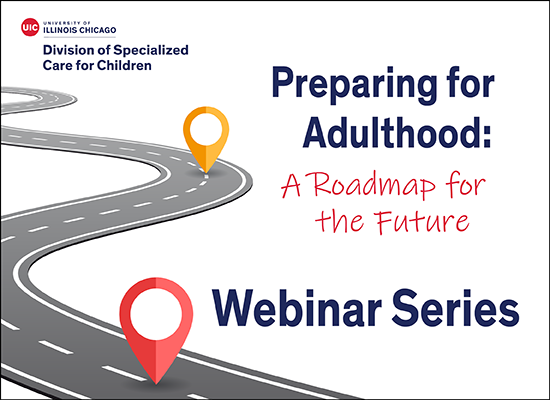
Learn practical strategies and tools to plan for the transition to adulthood during our free two-part series
Families can face new challenges and shifting roles as young people move toward adulthood.
Join the Division of Specialized Care for Children (DSCC) to learn more about navigating this journey during our free “Preparing for Adulthood: A Roadmap for the Future” webinar series.
The two-part series will feature Claire Cook, DSCC Title V Transition Specialist, and Suzanne Aaron, Northern Illinois Outreach Specialist for Illinois Life Span.
The sessions will cover:
- “Session One: Navigating Adult Systems,” June 26 at 6 p.m.
This session is for youth ages 12 to 15 and their families. Families with children at other developmental stages are also welcome to attend.
This session will provide practical tools for exploring and understanding adult systems, such as health care, education, employment and more. It will also cover strategies for balancing independence and guidance as family roles evolve.
- “Session Two: Empowering Parents and Caregivers,” July 31 at 6 p.m.
Session two is for parents, caregivers and families of youth ages 16 and older with complex needs and/or disabilities.
Building on session one, participants will dive deeper into adult guardianship, health insurance, benefits and programs for youth with complex needs. The session will focus on creating meaningful daily routines while managing evolving family dynamics. It will also explore the role of support circles and how to make decisions that support youth and caregivers in the long run.
- “Primera sesión: Recorrer los sistemas de los adultos,” 26 de junio a las 6 p. m.
Esta sesión es para padres, cuidadores, familias y jóvenes de 12 a 15 años. Las familias de jóvenes en otras etapas de desarrollo también son bienvenidas.
- “Segunda sesión: Empoderar a los padres y cuidadores,” 31 de julio a las 6 p.m.
Según la primera sesión, este seminario web se centrará en tutela de adultos, seguro médico, beneficios y programas para jóvenes con necesidades complejas, crear rutinas diarias importantes mientras se maneja la dinámica familiar en evolución y la función de los círculos de apoyo y cómo tomar decisiones que apoyen a los jóvenes y a los cuidadores a largo plazo. Esta sesión ofrecerá a las familias conocimientos y estrategias adaptadas a sus retos únicos.
Each presentation will be in English. Live Spanish interpretation will be available.
The recordings and slides for both sessions will be available on our Family Education Webinars page.
If you have questions about the series, please contact Claire Cook at clairer3@uic.edu or (800) 322-3722.
Please spread the word and plan to join us!
Inclusive Camps for All Ages Offer Fun, Friendships and New Adventures!

Check out our summer camp list to explore opportunities and find the right fit for your camper
Does your child want to make new friends? Develop new skills? Meet others with their condition or become more independent?
Head to our 2025 summer camp list. You’ll find accessible day, overnight and family camps across Illinois and beyond.
These programs welcome campers with a wide range of needs, abilities and many of our Core Program’s eligible medical conditions. The camps also cater to a wide range of interests, including:
- Learning to program and other computer skills
- Building independence and self-advocacy skills
- Exploring the great outdoors
- Cooking, art, drama and more
If you’re looking for the perfect camp opportunity, there are several ways to search on our website:
- Use the search box and filter option on our Events page to search for camps and other related keywords and locations
- View our 2025 summer camp list
- Use our Events Calendar view
Our list continues to grow, so check back often!
PLEASE NOTE: we share these opportunities for information purposes only. The Division of Specialized Care for Children (DSCC) does not manage or coordinate these camp opportunities or programs. If you have questions about a specific camp, please use the contact number or website we list for each program.
If you know of any summer camp opportunities we should add, please send us the details at dscc@uic.edu.
Here’s to a fantastic summer filled with smiles and new experiences!
Free Family Webinar Series Focuses on Medicaid Waivers
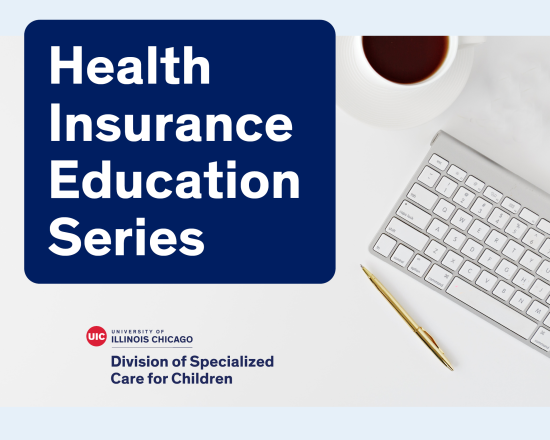
Learn more about the MFTD, DRS and DDD Medicaid waivers and how they can help your family
Our annual Health Insurance Education Series returns in March to help families understand important health insurance topics.
In response to family feedback, our 2025 series will explain Medicaid Home and Community-Based Services Waiver Programs for Illinois.
The webinars are open to Division of Specialized Care for Children (DSCC) participants, their family members and anyone interested in these topics.
These free virtual trainings will feature DSCC team members and other presenters covering a different waiver each month:
- Medically Fragile and Technology Dependent (MFTD) Medicaid Waiver, March 11 at 6 p.m.
- The March presentation will focus on the Medically Fragile and Technology Dependent Waiver for children and adults. Presenters from DSCC will explain how to apply, who is eligible, what benefits are available, and how to use the benefits.
- See the MFTD Medicaid Waiver flyer
- Register on Zoom for MFTD Medicaid Waiver
- The March presentation will focus on the Medically Fragile and Technology Dependent Waiver for children and adults. Presenters from DSCC will explain how to apply, who is eligible, what benefits are available, and how to use the benefits.
- Division of Rehabilitation Services (DRS) Medicaid Waivers, April 8 at 6 p.m.
- The April presentation will focus on the different waivers available for children and young adults through the Division of Rehabilitation Services (DRS). Presenters from DRS will explain how to apply, who is eligible, what benefits are available, and how to use the benefits.
- See the DRS Medicaid Waivers flyer
- Register on Zoom for DRS Medicaid Waivers
- The April presentation will focus on the different waivers available for children and young adults through the Division of Rehabilitation Services (DRS). Presenters from DRS will explain how to apply, who is eligible, what benefits are available, and how to use the benefits.
- Division of Developmental Disabilities (DDD) Medicaid Waivers, May 13 at 6 p.m.
- The May presentation will focus on the different waivers for children and young adults available through the Division of Developmental Disabilities (DDD). Presenters from DDD will explain how to apply, who is eligible, what benefits are available, and how to use the benefits.
- See the DDD Medicaid Waivers flyer
- Register on Zoom for DDD Medicaid Waivers
- The May presentation will focus on the different waivers for children and young adults available through the Division of Developmental Disabilities (DDD). Presenters from DDD will explain how to apply, who is eligible, what benefits are available, and how to use the benefits.
- La Excepción de Medicaid para personas médicamente frágiles y dependientes de la tecnología (MFTD), 11 de marzo, a las 6 p.m.
- La presentación de marzo se centrará en la excepción para personas médicamente frágiles y dependientes de la tecnología para niños y adultos. Los presentadores de la División de Atención Especializada para Niños (DSCC) le explicarán cómo presentar la solicitud, quién es elegible, qué beneficios están disponibles y cómo utilizarlos.
- Consulte el folleto de Beneficios de MFTD para obtener más detalles.
- Registrarse para MFTD en Zoom.
- La presentación de marzo se centrará en la excepción para personas médicamente frágiles y dependientes de la tecnología para niños y adultos. Los presentadores de la División de Atención Especializada para Niños (DSCC) le explicarán cómo presentar la solicitud, quién es elegible, qué beneficios están disponibles y cómo utilizarlos.
- Excepciones de Medicaid de la División de Servicios de Rehabilitación (DRS), 8 de abril a las 6 p.m.
- La presentación de abril se centrará en las diferentes excepciones disponibles para niños y adultos jóvenes a través de la División de Servicios de Rehabilitación (DRS). Los presentadores de DRS explicarán cómo presentar la solicitud, quién es elegible, qué beneficios están disponibles y cómo utilizarlos.
- Consulte el folleto de Excepciones de Medicaid de la DRS para obtener más detalles.
- Registrarse para Excepciones de Medicaid de la DRS en Zoom.
- La presentación de abril se centrará en las diferentes excepciones disponibles para niños y adultos jóvenes a través de la División de Servicios de Rehabilitación (DRS). Los presentadores de DRS explicarán cómo presentar la solicitud, quién es elegible, qué beneficios están disponibles y cómo utilizarlos.
- Excepciones de Medicaid de la División de Discapacidades del Desarrollo (DDD), 13 de mayo a las 6 p.m.
- La presentación de mayo se centrará en las diferentes excepciones para niños y adultos jóvenes disponibles a través de la División de Discapacidades del Desarrollo (DDD). Los presentadores de DDD explicarán cómo presentar la solicitud, quién es elegible, qué beneficios están disponibles y cómo utilizarlos.
- Consulte el folleto de Excepciones de Medicaid de la DDD para obtener más detalles.
- Registrarse para Excepciones de Medicaid de la DDD en Zoom.
- La presentación de mayo se centrará en las diferentes excepciones para niños y adultos jóvenes disponibles a través de la División de Discapacidades del Desarrollo (DDD). Los presentadores de DDD explicarán cómo presentar la solicitud, quién es elegible, qué beneficios están disponibles y cómo utilizarlos.
You can also:
- Download a flyer with all Health Insurance Education Series topics and registration links. (The flyer is also available in Spanish.)
- See details about each series session on our Events page.
- Watch the session recordings and access related materials anytime on our Family Education Webinars page.
Our Health Insurance Education Series began in response to questions and suggestions from our Family Advisory Council.
If you have questions about these webinars before or after a session, please email dscc@uic.edu or call (800) 322-3722.
DSCC Families, We Want Your Feedback!

Our annual family survey is an easy way to share your input and help improve our services.
Attention participant families, be sure to watch your mail or email!
On Feb. 10, all Division of Specialized Care for Children (DSCC) participants will receive our annual family survey.
This survey asks how well our team members support your family and meet your needs. It also asks about:
- Your contact preferences
- How and when you’d like to meet with our team
- How well our staff communicates with you
You will receive this survey by email or mail, based on your preferences. If you respond, you could win one of five $50 Amazon gift cards.*
Your responses will help us strengthen your services. They also guide updates to our DSCC policies and procedures that affect your family.
Our surveys are optional, but we strongly encourage you to share your experiences. We want to ensure we’re doing all we can to help you meet your family’s needs and achieve your goals.
* Please note: Foreign national nonresident aliens are not eligible for the gift card participation prize.
How Your Feedback Makes a Difference
Your ideas and feedback help improve our services to families like yours. We used family input from last year’s survey to:
- Train our care coordination teams to better understand the family perspective and tailor services to your unique needs and wants.
- Educate families about the benefits of our DSCC Family Portal to easily communicate and share information with your care coordination team.
- Launch NurseNet, a new online tool to help families connect with available in-home nurses.
- Offer free webinars on important health insurance topics affecting families.
- Improve our language access to better support our families’ diverse backgrounds.
- Reorganize our Chicago offices to better serve the Chicago community.
Please be on the lookout for our annual survey on Feb. 10.
If you have questions or need more information, please contact your Care Coordinator.
We appreciate your partnership and look forward to hearing from you!
Mokena Care Coordinator Earns DSCC’s Award of Merit

DSCC honors Meeka Hudson for her dedication to supporting Illinois children and youth with special healthcare needs and their families
Care Coordinator Meeka Hudson is the 2024 recipient of the University of Illinois Chicago’s Division of Specialized Care for Children (DSCC) Award of Merit.
The award recognizes exceptional employees for outstanding dedication and service to Illinois children with special healthcare needs and their families.
Meeka is a Care Coordinator in the Mokena Regional Office. She joined the Core Program team in 2018 and has played an invaluable role in empowering families ever since.
“Meeka is an exceptional Care Coordinator with a passion for helping her participant families navigate difficult situations and finding ways to reduce stress in their lives,” DSCC Executive Director Thomas F. Jerkovitz said.
“Her teammates praise her dedication, knowledge of resources and willingness to help. Meeka has also been instrumental in developing valuable education and networking opportunities for families based at the Mokena office.”
Meeka’s colleagues in the Mokena office nominated her for the award, noting her positive influence, expertise, compassion and creativity.
“Meeka’s dedication to her role is evident in everything she does,” Mokena Assistant Regional Manager Tami L. Peleckis said. “She is always ready to lend a hand, provide guidance, and share her expertise with her colleagues. Her positive attitude and willingness to go the extra mile make her an indispensable asset to our team.”
Program Coordinator Assistant Leslie Leske-Ely praised Meeka’s ability to break down information into manageable steps and empower families to take charge of their situations.

“She provides positive and innovating contributions to our office. Her ideas help in improving our office morale and family engagement,” Bilingual Care Coordinator Ana Lule said. “Meeka consistently goes above and beyond to ensure that families receive the support and resources they need. She approaches every case with empathy and a genuine desire to make a positive impact.”
Mokena Regional Manager Deanna Deleshe has worked with Meeka since she started at DSCC. When Meeka’s participant families wanted a space to network with other families in their same situation, Meeka saw a need and shared an idea with Deanna.
“Meeka was the inspiration behind our pilot of the Mokena Family Networking and Education Group called the Mokena Connection,” Deanna said. “Meeka also, along with other team members, was the inspiration behind all of our in-person office events (for participant families). We do our Winter Wonderland, our Spring Fling, our Summer Extravaganza and our Trunk or Treat.”
Meeka said she is “deeply honored and incredibly grateful to receive the 2024 Award of Merit.”
“This recognition is not just a personal achievement, but a reflection of the support, encouragement and inspiration I’ve received from the Mokena Regional Office Team,” Meeka continued. “I am truly fortunate to work alongside such talented, dedicated individuals.”
Meeka thanked DSCC’s leadership and added a special thank you to her managers Deanna and Tami, whose belief in her has made all the difference.
“This award is a testament to the teamwork, hard work, and passion that we put into everything we do,” she said.
Learn more about Meeka and her exceptional service to families in this video below:
DSCC staff nominated a total of 13 of their colleagues for this year’s Merit Award. As the winner, Meeka will receive a Merit Award memento, a $2,500 award and recognition from the Executive Director.
Congratulations to the rest of our 2024 DSCC Award of Merit Nominees:
- Daniel “Dan” Beagles, Training and Development Specialist, Mokena Regional Office (RO)
- Becky Helmink, Program Coordinator Assistant, Olney RO
- Andrea Hoskinson, Assistant Director Operations-Finance, Accounting and Procurement, Central Administrative Office (CAO)
- Amanda Kaufman, Care Coordinator, Home Care (HC) Region 3
- Cristina Lazala, Bilingual Program Coordinator Assistant, HC Region 2
- Cathleen “Cathy” Morrissey, Program Coordinator Assistant, Mokena RO
- Patricia Perez, Assistant Director of Operations-Research and Practice Initiatives, Chicago RO
- Yariela “Yari” Ramirez Beccue, Program Services Specialist, CAO
- Mary Ratermann, HC enrollment Specialist, St. Clair RO
- Adell Scott, Manager of HC Quality Improvement, St. Clair RO
- Paige Town, Assistant Regional Manager, Rockford RO
- Imani Wornum, Care Coordinator, HC Region 5
Learn more about all of the 2024 nominees in this recap video of the Award of Merit luncheon on Oct. 29 in Springfield:
NurseNet Simplifies the Search for In-Home Nursing
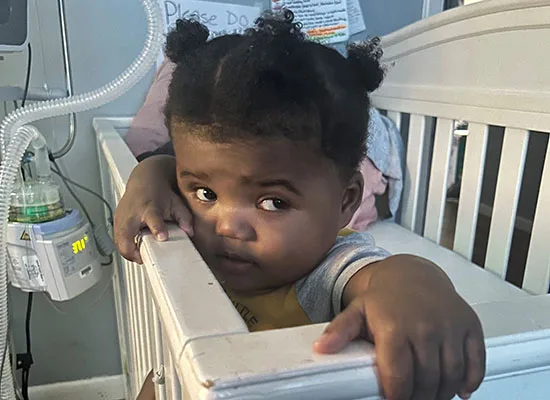
Home Care Program parent praises NurseNet as an easy way to find available nurses in your area
The search for in-home nurses can be exhausting for many families of loved ones with complex medical needs.
Home Care Program parent Shekia Wright understands this challenge.
She recently tried NurseNet to find available nurses for her 1-year-old son, Kaharri Pittman (pictured above). He has a tracheostomy and relies on a ventilator to breathe.
Shekia set up a NurseNet account and entered Kaharri’s nursing needs.
She quickly found two available matches from two different nursing agencies. Overall, she was impressed with how easy NurseNet is to use.
“It was easy to set up the account and easy to find available nurses,” Shekia said. “I would recommend NurseNet to any families looking for nursing.”
NurseNet is a new tool that makes it easier for families to find the in-home nursing care their child needs. We created NurseNet to be an online resource that connects families with available in-home nursing providers throughout Illinois.
Families can use NurseNet to share their nursing needs. Nursing agencies that are enrolled with the Division of Specialized Care for Children (DSCC) can see this information and contact families if they have available nurses who match the child’s care needs.
Nursing agencies can also use NurseNet to share information about where nurses are available.
This information can help families find suitable nursing care. It can also help nursing agencies identify opportunities to serve families.
How NurseNet Helps Families
- Easy Access: NurseNet is available 24/7, giving you the flexibility to search for nursing providers at your convenience.
- Comprehensive Listings: The tool includes a wide range of in-home nursing providers across the state, ensuring you have multiple options to choose from.
- Direct Connection: You can contact nursing providers directly through NurseNet, making the process of securing care for your child quicker and more straightforward.
How to Get Started
We encourage you to visit our NurseNet page and explore this new tool. There you’ll find guides and how-to videos to help you get started.
If you have problems accessing NurseNet, please send an email to dsccexternalhelp@uic.edu.
You can also talk to your DSCC Care Coordinator to help you get started. Your Care Coordinator can assist with the sign-up process during your next home visit.
We understand how important it is to have reliable, skilled nursing care for your child. We believe NurseNet will significantly improve your ability to find the support you need!
DSCC Rolls Out New Tool to Better Connect With Our Participant Families
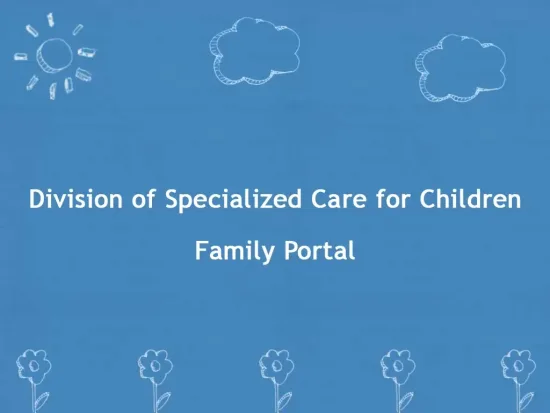
The DSCC Family Portal can help you easily communicate with your care coordination team and find the information you need
It’s important for our Division of Specialized Care for Children (DSCC) participant families to be active partners in their child’s care. We’re excited to introduce a new way for you to easily share information and communicate with your DSCC care coordination team.
Our new DSCC Family Portal aims to help you find the records you need all in one convenient place.
You can use the Family Portal to:
- Send messages
- Sign documents
- View important letters
- See a list of providers and much more
To access the portal, visit https://go.uic.edu/DSCCFamilyPortal.
To log in to the Family Portal for the first time, you will need:
- Your email address
- Your DSCC participant’s name or DSCC ID number
- A unique password
We know learning a new application can seem tough. We have tip sheets and videos to help you get started and feel comfortable using the portal. You can find these resources on our website at https://dscc.uic.edu/dscc-family-portal/.
If you have trouble accessing the Family Portal or need other support, please email dsccexternalhelp@uic.edu. A designated DSCC staff person will help you as soon as possible.
We are always looking for ways to improve our services and strengthen our support for families.
We hope the Family Portal will be an easy and convenient way for you to connect with your care coordination team and the resources you need.
New Training Resources on Caring for Children With Trachs
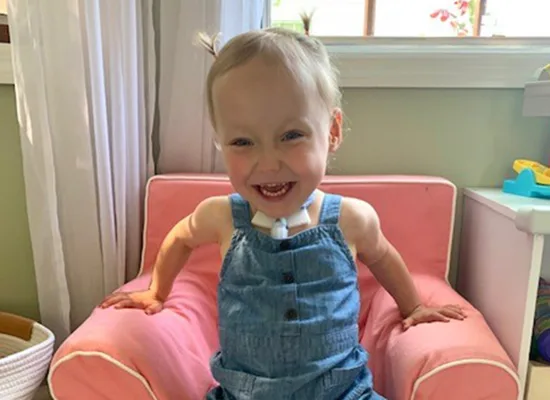
A new video and an updated free online course are available to help support the care of children with tracheostomy tubes
Parents and caregivers have a lot to learn when their child needs a tracheostomy (trach) tube to breathe.
Our Division of Specialized Care for Children (DSCC) team is here to support and guide families through learning how to care for their children’s complex medical needs.
We’ve gathered two new training resources to help families understand trach care.
Lurie Children’s Hospital Video on How to Handle Trach Emergencies
When emergency situations occur, it’s very important to keep the child’s trach tube open and in place.
Ann and Robert H. Lurie Children’s Hospital of Chicago has developed a video to help parents, caregivers and others know how to handle emergency situations with pediatric trach patients.
In this video, Lurie nurses explain:
- How to prevent and assess emergency situations
- How to manage a mucous plug
- How to replace a trach tube that has become dislodged
- What to do if the trach tube is difficult to replace
- When to provide manual ventilation using bag to trach tube, bag and mask to mouth, and mouth to mouth
We encourage our participant families in the Home Care Program to watch this video. Many of the children and youth in the Home Care Program rely on trachs and ventilators to breathe.
Please note that watching this video alone is not enough training to safely care for a child with a trach. Families should speak with their child’s doctors and care team about any questions or training needs.
For more information on how to safely care for a trach tube, you can visit Lurie’s Tracheostomy Care at Home webpage.
Free eHomeCare Course on How to Care for Children With A Trach
An updated free online course is available on how to care for children with trachs with or without a ventilator.
The eHomeCare program training is for:
- Nurses working in home-based environments
- Physicians
- Respiratory therapists
- Family members and caregivers of children with trachs with and without ventilators
- Students from health professions
The course is available until Sept. 30, 2026.
Learners can use this course for initial training, an annual review or as an ongoing resource.
The course learning objectives are:
- Describe best practices for providing day-to-day care for children with trachs with or without ventilators in the community
- Explain how to manage emergency situations for children with trachs with or without ventilators in the community
- Report an increase in confidence when caring for children with trachs with or without ventilators in the community
- Describe the roles and responsibilities of members of the healthcare team.
Free continuing education credits are available.
If you have trouble enrolling in the course or need help, please email help@icep.wisc.edu.
Again, please note that families should speak with their child’s doctors and care team about any questions or training needs for their child with a trach.
Our participant families can also contact their DSCC Care Coordinator with questions.
Important Reminders: End of Public Health Emergency and Return to In-Person Visits
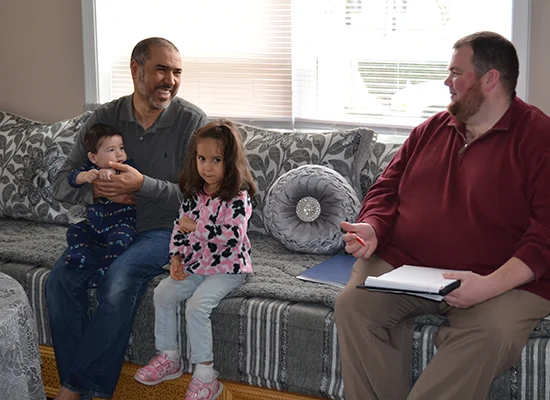
An overview of key changes affecting all Division of Specialized Care for Children participants now that the public health emergency is over
The public health emergency due to the COVID-19 pandemic ended on May 11, 2023.
This ending brings a variety of changes for our Division of Specialized Care for Children (DSCC) participant families. These changes include a return to in-person visits from DSCC Care Coordinators, an end to verbal signatures and more.
The following sections give an overview of key points and important dates to remember:
- Reminders for All DSCC Program Participants
- Reminders for Home Care Program Participants
- Important Medicaid/Insurance Updates for All DSCC Participants in Medicaid
- Contact Reminders for All DSCC Program Participants
Reminders for All DSCC Program Participants
Return to In-Person Visits
Meeting in person with our participants and families is an important part of care coordination. The public health emergency allowed face-to-face visits to occur virtually. Now that the public health emergency has ended, we must return to face-to-face meetings with our participants.
Your DSCC Care Coordinator will work with you in advance to schedule your next in-person/home visit. We understand that in-person visits with your Care Coordinator may be a change for you and your family. We paused these visits for several years during the public health emergency (though many families continued to meet with their Care Coordinator during the pandemic).
Seeing you in person helps us get to know you and your family better. It can also help improve your connection with your DSCC Care Coordinator. Our partnership with Medicaid and Medicaid managed care plans also requires us to meet with you in person. If you have any concerns about in-person visits, please talk to your Care Coordinator. We will work with you to see how to best accommodate your preferences.
Verbal Signatures
The public health emergency allowed your Care Coordinator to receive necessary signatures verbally. As of May 11, 2023, it is a federal rule that DSCC can no longer accept verbal signatures.
- Electronic signature options (such as through Adobe) remain an option for families when signing DSCC documents.
Reminders for Home Care Program Participants
End of Continued Medicaid and Program Enrollment for Those Found Ineligibile for Services
Starting April 1, 2023, DSCC began working with the Illinois Department of Healthcare and Family Services (HFS) to reassess all Home Care Program participants who received a notice of ineligibility for the program since March 1, 2020. Now that the public health emergency has ended, HFS’ notices accurately list the approved level of services for you or your child.
- If you or your child received a notice of ineligibility for services since March 1, 2020, your services will remain in place until HFS completes a reassessment. The reassessment looks at your updated and current medical documentation and will occur before Sept. 30, 2023.
- If you or your child received a notice of reduced nursing hours since March 1, 2020, your Care Coordinator will complete the next reassessment of services at your regularly scheduled renewal time. Services will remain in place until this reassessment occurs.
Reminders for Individuals in the Non-Waiver Program (Nursing and Personal Care Services)
Now that the public health emergency has ended, all individuals who turn 21 and are not on the Home and Community-Based Services Waiver for Those Who Are Medically Fragile Technology Dependent (MFTD), will not be eligible for services. If you or your child were on non-waiver services and turned 21 between the dates of March 1, 2020, and March 31, 2023, services will end on Sept. 30, 2023. Your Care Coordinator will work with you to ensure you or your child is set with an alternate state waiver, such as the Division of Rehabilitative Services (DRS), if applicable.
For all non-waiver participants under age 21, you must continue to have Medicaid coverage to receive Home Care services. It is important that you submit the redetermination form from Medicaid to keep your coverage. If you fail to meet Medicaid eligibility or do not respond in time, HFS will cancel your Medicaid case. Your Home Care services will then also end.
Additional COVID-19 Respite Allotment
During the public health emergency, HFS approved an additional 336 hours of respite to use before the regular respite allotment. This additional respite is for all Home Care MFTD waiver participants. Starting Nov. 11, 2023, this additional COVID respite will expire. All respite used after Nov. 11, 2023, will come from the standard respite allotment.
Personal Protective Equipment (PPE)
During the public health emergency, nursing agencies were reimbursed for PPE when actively staffing nurses in the home. The PPE is for the nurses to use while caring for participants. This reimbursement of PPE supplies to the nursing agencies will end on Nov. 11, 2023.
Nursing Supervisory Visits
Nursing agencies resumed in-person supervisory visits in November 2020. Effective May 11, 2023, there can be no exceptions to replace in-person supervisory visits.
Important Medicaid/Insurance Updates for All DSCC Participants in Medicaid
These next sections explain important Medicaid updates now that the public health emergency and continuous Medicaid coverage period has ended. The end of the public health emergency may also affect your Medicaid coverage or your private health insurance coverage.
No More Copays or Premiums for Medicaid
Most Medicaid programs no longer have premiums or copays. All Kids Assist, Aid to the Aged Blind and Disabled (AABD) and Adult Medicaid do not have monthly premiums or copays for services. All Kids Premium 1, Premium 2 and Share programs are all called All Kids Assist now.
Medical Redetermination for Medicaid
Redetermination is when Medicaid looks to see if you are still eligible. They look at your residency, monthly income and other criteria to decide if you still qualify.
Medicaid sent forms to some members as early as May 2023. They will not complete redetermination on all cases at the same time. They will make the redeterminations over several months. This means that your Medicaid redetermination could happen now or later, even next year. It is important to make sure Medicaid has your current address. You can report your address online at Medicaid.illinois.gov or call (877) 805-5312. We also have a news post with more details about how to update your address.
Please watch your mail for letters from Medicaid.
Once you receive your redetermination notice, you will have about a month to respond. Medicaid may ask for more information about your income, residency or other information. If Medicaid asks for more information and you do not respond, your Medicaid coverage ends. You can return the redetermination in several ways:
- Online at ABE.illinois.gov using Manage My Case. Manage My Case is the quickest way to complete your redetermination.
- By mail.
- In person at a local Illinois Department of Human Services (DHS) Family Community Resource Center.
- By phone.
If you are in a Medicaid managed care plan (MCO), please remember the MCO does not do the redetermination. Medicaid does redetermination reviews. If you do not qualify for Medicaid anymore, your coverage ends. If you are still eligible, you keep your Medicaid coverage.
Don’t risk losing your health insurance. Please update your address with Illinois Medicaid. It’s easy, fast and free:
- Call (877) 805-5312 from 7:45 a.m. to 4:30 p.m., Monday through Friday.
- Visit medicaid.illinois.gov.
- If you use a TTY, call (877) 204-1012.
Please contact your DSCC Care Coordinator if you have questions about Medicaid redetermination.
Telehealth Coverage
Telehealth coverage for Medicaid (and other insurances) is a permanent change and will continue after the public health emergency to give Medicaid time to review for any future changes. You can review the HFS Provider Notice issued May 9, 2023, on Telehealth to learn more.
An Illinois law signed in 2021 requires insurance to cover telehealth through 2027. This law does not require that practitioners or providers offer telehealth services. Therefore, your providers may not offer telehealth care. The law only says that insurance must pay providers for telehealth care if they provide it.
Pharmacy Billing and Prior Approval Requirements
Pharmacy billing and prior approval requirements for Medicaid will resume. There were many flexibilities that allowed Medicaid members to get medications. These include overriding the refill too soon and waiving requirements for the preferred drug list, quantity and brand limits. If you go to the pharmacy and they tell you that you can’t get your medications, ask your doctor to submit a prior approval to Medicaid. You can review the HFS Provider Notice issued May 3, 2023, on Pharmacy Billing to learn more. Contact your DSCC Care Coordinator for more help.
DME and Therapy Prior Approval Requirements
DME and therapy prior approval requirements for Medicaid will resume. There are some services that Medicaid did not require a prior approval for during the public health emergency. These services include therapy, home health and some durable medical equipment (DME). It is important for your providers to get a prior approval so that Medicaid reviews medical eligibility for the services. You can review the HFS Provider Notice issued April 4, 2023, on Prior Approval Requirements for more details. Contact your DSCC Care Coordinator for more help.
COVID-19 Tests, Treatment, and Vaccines
Uninsured individuals will no longer get access to special COVID-19 Medicaid eligibility which included testing, services, treatment, and vaccine administration during the public health emergency. You can view the HFS Provider Notice issued May 9, 2023, on Uninsured Population Special COVID-19 Coverage. Medicaid members who do have eligibility will continue to be able to access treatment, testing and vaccines.
Those with private insurance should also be able to continue to access treatment and vaccines as outlined by their plan.
Insurance plans will no longer cover over-the-counter tests for COVID-19 for free. Generally, a doctor will need to order the test and provide them in an office or similar facility. This may vary from plan to plan. You should call your insurance plan if you have questions. There may also be community organizations or public health departments still distributing COVID-19 tests and related services, such as vaccines, for free.
Extension of COBRA
During the public health emergency, there was an extension of election and notice deadlines for someone to take COBRA after losing or leaving a job. That will expire 60 days after May 11, 2023.
Temporary Special Enrollment Period
For individuals who no longer qualify for Medicaid after they go through redetermination, there is a special open enrollment period through the federal health insurance marketplace to purchase private insurance. It will extend from March 31, 2023, to July 31, 2024. This is only for people with a special qualifying event, such as losing coverage. Otherwise, the regular open enrollment period will be in November and December for individuals who need to enroll in private insurance through the marketplace. The Illinois website is GetCovered.illinois.gov and the federal website is HealthCare.gov.
Questions? Contact Us!
As a DSCC participant family, you can contact us with any questions or support your family needs.
Please note the best way to reach your care coordination team or any DSCC office is through our toll-free number of (800) 322-3722.
You can use this number to dial your Care Coordinator’s direct extension or to have our Customer Service Representatives connect you with the right person/team.
We have updated our phone system and ask everyone to use the (800) 322-3722 number as the simplest and fastest way to reach us.
Our office hours are 8 a.m. to 4:30 p.m. Please talk to your Care Coordinator if you have a need to speak outside of business hours.
You may also reach us through our general dscc@uic.edu inbox or use our Contact Us or Request a Callback forms on our website.
Please talk with your Care Coordinator if you have more questions or need to update your communication preferences.
We are thankful for your partnership throughout the changes related to the end of the pandemic and public health emergency. Our team will continue to help support your family and connect you with the right services and resources.


